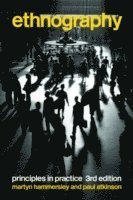
- Format
- Häftad (Paperback)
- Språk
- Engelska
- Antal sidor
- 276
- Utgivningsdatum
- 2007-01-01
- Upplaga
- 3 New edition
- Förlag
- Routledge
- Illustrationer
- 2 Line drawings, black and white; 2 Illustrations, black and white
- Dimensioner
- 245 x 175 x 15 mm
- Vikt
- Antal komponenter
- 1
- ISBN
- 9780415396059
- 440 g
Ethnography
Principles in Practice
Kundrecensioner
Fler böcker av författarna
-
Amplified
Paul Atkinson
-
Ethnographic Engagements
Sara Delamont, Paul Atkinson
-
New Genetics, New Identities
Paul Atkinson, Peter Glasner, Helen Greenslade
Övrig information
Martyn Hammersley is Professor of Educational and Social Research at the Open University. His early research was in the sociology of education, focusing in particular on teachers' perspectives, patterns of classroom interaction, and assessment regimes. More recently he has investigated the representation of social research findings in the mass media. His most recent books are Taking Sides in Social Research (2000), Educational Research: Policy Making and Practice (2002), and Media Bias in Reporting Social Research? (2006). Paul Atkinson is Distinguished Research Professor of Sociology at Cardiff University, where he is Associate Director of the ESRC Centre for Economic and Social Aspects of Genomics. His main research interests include the sociology of cultural production, the sociology of medical knowleddge, with particular emphasis on the social consequences of new genetic technologies and the development of qualitative research methods, including applications of information technology. His most recent books have been Everyday Arias: An Operatic Ethnography (2005) and Interactionism with William Housley (2003). Together with Sara Delamont he edits the journal Qualitative Research.
Innehållsförteckning
Prologue 1. What is Ethnography? 2. Research Design: Problems, Cases, and Samples 3. Access 4. Field Relations 5. Oral Accounts and the Role of Interviewing 6. Documents and other Artefacts, Real and Virtual 7. Recording and Organizing Data 8. The Process of Analysis 9. Writing Ethnography 10. Ethics. Epilogue
Du kanske gillar
-
Knife
Salman Rushdie
Inbunden
